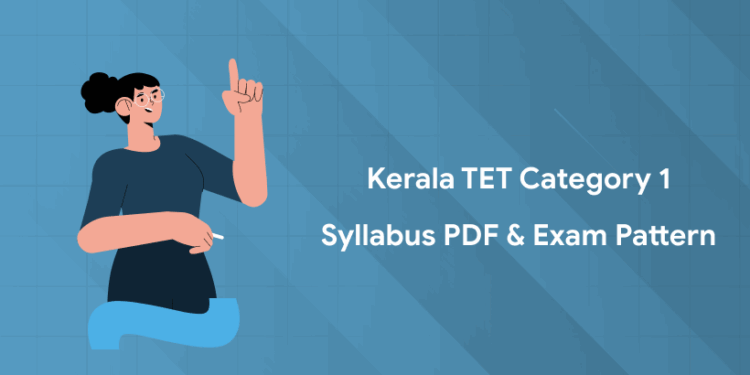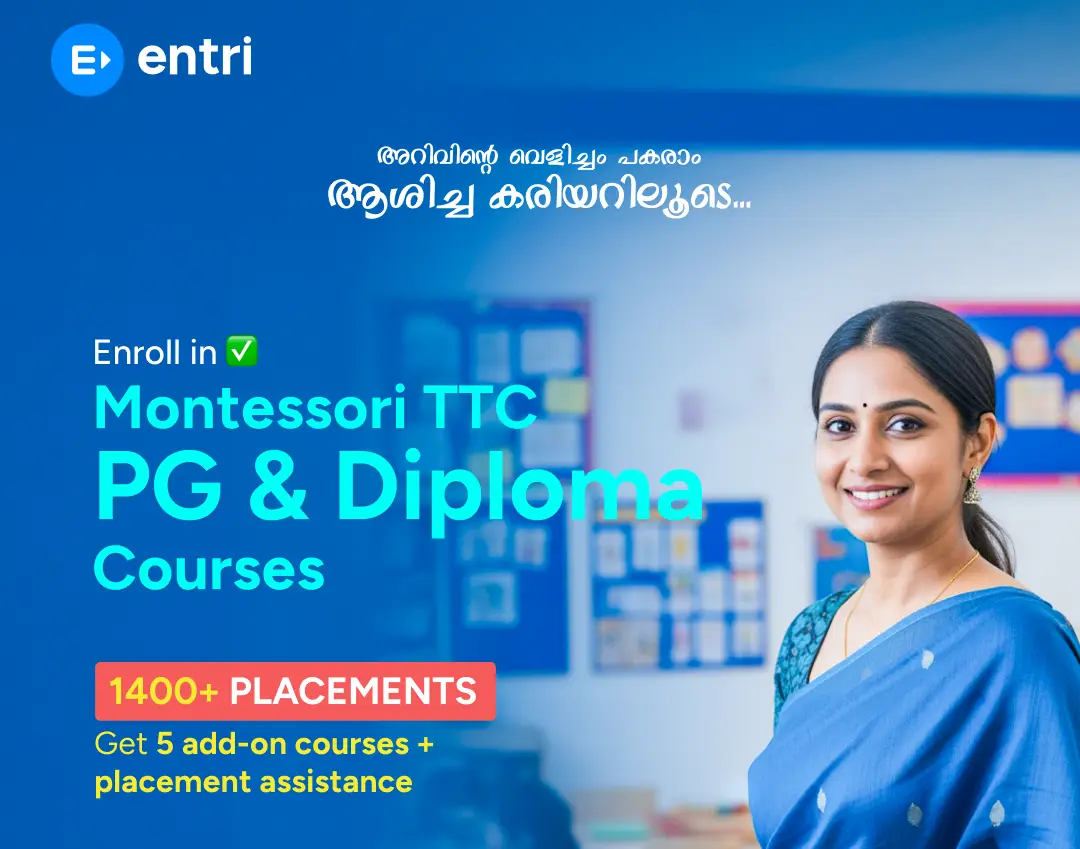Table of Contents
The Kerala Pareeksha Bhavan has released the KTET 2026 Category 1 syllabus on its official website. The exam is scheduled for February 21, 2026. In this blog, we’ve included the official syllabus PDF and the latest exam pattern to help Lower Primary teacher aspirants prepare effectively. Download the syllabus and start your preparation today!
KTET 2026 Recruitment Highlights
| Particulars | Details |
|---|---|
| Exam Name | Kerala Teacher Eligibility Test (KTET) |
| Conducting Body | Kerala Pareeksha Bhavan |
| Notification Release Date | 22/12/2025 |
| Application Start Date | 22/12/2025 |
| Application Last Date | 12/01/2026 |
| Hall Ticket Release Date | 11/02/2026 |
| Exam Dates | 21/02/2026 & 23/02/2026 |
| Answer Key Release | Yet to be Released |
| Result Date | Yet to be Released |
| Mode of Exam | Offline (OMR-Based) |
| Official Website | ktet.kerala.gov.in |
What is KTET Category 1?
1: The first recipient of the ‘Rajiv Gandhi Khel Ratna’ award?
KTET 2026 Category 1 is the Kerala Teacher Eligibility Test conducted for candidates aspiring to become Lower Primary (LP) school teachers—that is, for teaching classes I to V in Kerala government or aided schools. It assesses a candidate’s eligibility and teaching aptitude in subjects like Child Development and Pedagogy, Malayalam/English, Mathematics, and Environmental Studies. Clearing KTET Category 1 is a mandatory qualification for LP school teacher posts in Kerala.
Enroll in Kerala's Top-rated HSA Coaching Program!
സർക്കാർ ജോലി എന്ന സ്വപ്നം ഇനി സ്വപ്നം മാത്രമല്ല! Join Entri's HSA Coaching Program
Join Now!KTET 2026 Category 1 Syllabus PDF Download
The official KTET 2026 Category 1 syllabus outlines the subjects and topics candidates must prepare for the Lower Primary level exam. It includes Child Development & Pedagogy, Language I (Malayalam/Kannada/Tamil), Language II (English/Arabic), Mathematics, and Environmental Studies. You can download the official syllabus PDF below and start preparing with the latest exam structure and content.
KTET 2026 Category 1 Previous Question Papers PDF
| Set | Download Link |
|---|---|
| Category I – Set 1 | |
| Category I – Set 2 |
KTET 2026 Category I Model Question Paper
Need a better idea of what to expect in the exam?Here’s a KTET 2026 model question paper for KTET Category 1, designed as per the latest syllabus and pattern. Download it and prepare well!
Enroll in Kerala's Top-rated HSA Coaching Program!
സർക്കാർ ജോലി എന്ന സ്വപ്നം ഇനി സ്വപ്നം മാത്രമല്ല! Join Entri's HSA Coaching Program
Join Now!KTET 2026 Category 1 Exam Pattern
- Mode of Exam: Offline (OMR-based)
- Type of Questions: Multiple Choice Questions (MCQs)
- Total Questions: 150
- Total Marks: 150
- Duration: 2 hours 30 minutes
- Marking Scheme: 1 mark per question, no negative marking
- Syllabus Basis: SCERT Kerala curriculum (Classes I to VIII)
| Part | Subject | No. of Questions | Marks |
|---|---|---|---|
| Part I | Child Development and Pedagogy | 30 | 30 |
| Language I (Malayalam/Tamil/Kannada) | 30 | 30 | |
| Part II | Language II (English/Arabic) | 30 | 30 |
| Part III | Mathematics | 30 | 30 |
| Environmental Studies | 30 | 30 | |
| Total | 150 | 150 |
KTET 2026 – Kerala TET Category 1 Detailed Syllabus
Here’s the detailed syllabus for KTET 2026 Category 1, covering all key subjects like Child Development & Pedagogy, Languages, Mathematics, and Environmental Studies. The topics are based on the SCERT Kerala curriculum (Classes I to V). Check the full syllabus here!
CHILD DEVELOPMENT AND PEDAGOGY – 30 Questions
- Child Development and Learning (15 Questions)
- Methods of studying child behaviour – observation, case study, Interview, Psychological tests etc.
- Concept of development
- Principles of growth and development
- Influence of heredity and environment on human development
- Concept of learning
- Basic theories of learning : Conditioning (Pavlov, Skinner); Insight learning (Gestalt); cognitive learning (Piaget, Bruner and Vygotsky)
- Relation between development and learning : learner readiness of maturation
- Piaget, Kohlberg and Vygotsky : Constructs and critical perspectives.
- Concept of child – centered and progressive education – Activity based method of Teaching and Learning, Problem Based Learning
- Critical perspectives of construct of intelligence (Theories of Spearman, Guilford, Thurstone and Gardner).
- Language and Thought (Basic perspectives of Piaget, Chomsky and Vygotsky).
- Gender as a social construct: Gender roles, gender bias and educational practice
- Individual differences among learners, understanding differences based on diversity of language, caste, gender, community, religion etc.,
- Distinction between – Assessment for learning and Assessment of learning – school based Assessment (Internal assessment)
- Continuous and comprehensive evaluation: Perspectives and practice
- Assessing learner achievement – grading
- Personality development – concept of personality and basic approaches to personality (Psychoanalytic and Trait) – Adjustment mechanisms
Concepts of inclusive education and understanding children with special needs (5 Questions)
- Concept of exceptional children
- Concept of children with special needs (CWSN)
- Addressing learners from diverse backgrounds including disadvantaged and deprived
- Concept of learning disability (LD) – Addressing the needs of children with learning disabilities
- Addressing the Talented, creative, specially abled children
Learning and pedagogy (10 Questions)
- How children think and learn: how and why children fail to achieve success in school performance
- Different factors influencing learning and achievement
- Basic process of teaching and learning: Children’s strategies of learning – Learning as a social activity – social context of learning
- Child as a problem solver and ‘scientific investigator’ (concept of the nature of child by Piaget, Bruner and Vygotsky)
- Alternative concepts of Learning in children: Understanding children’s’ ‘errors’ as significant steps in the learning process (Self – corrective nature of the child)
- Cognition and Emotions – Emotion – Basic Emotions – characteristics of childhood emotionality.
- Emotional Development (Bridge’s)- cognition (Thinking, Reasoning, Problems solving and Investigation)
- Motivation and learning – How does motivation influence learning – Maslow’s theory of motivation
- Factors contributing to learning – Personal and environmental
Personality and adjustment
Concept – Approaches – Type, Trait – Allport – Measurement of personality – Projective and Non projective techniques – Adjustment Mechanisms
LANGUAGE I – MALAYALAM/KANNADA/TAMIL – 30 MARKS
A. MALAYALAM അവധാരണം (ഗദ്യം)
- കേന്ദ്രാശയം കണ്ടെത്തൽ
- നിഗമന രൂപീകരണം
- വിശകലനം
അവതരണം (പദ്യം)
- കേന്ദ്രാശയം കണ്ടെത്തൽ
- കാവ്യബിംബങ്ങൾ കണ്ടെത്തൽ
- വ്യാഖ്യാനിക്കൽ
മാതൃഭാഷാ ബോധശാസ്ത്രം
- ഭാഷാപഠന സിദ്ധാന്തങ്ങൾ
- വ്യത്യസ്ത കഴിവുള്ള കുട്ടികൾക്ക് പ്രത്യേക പരിഗണന നൽകുന്ന ഭാഷാപഠനം
- പാഠ്യപദ്ധതി വിനിമയത്തിന്റെ രീതിശാസ്ത്രം
ഭാഷ, സാഹിത്യം, സംസ്ക്കാരം
- ശൈലികളും പ്രയോഗങ്ങളും
- പ്രായോഗിക വ്യാകരണം
- പഴഞ്ചൊല്ലുകൾ
- സാഹിത്യരൂപങ്ങൾ
- താളബോധം
TAMIL 30 Questions 1. Reading Comprehension – Prose
- Comprehension of theme
- Interpretation
- Inference
2. Reading Comprehension – Poem
- Comprehension of themes
- Poetic images
- Interpretation
3. Pedagogical aspects of Mothertongue Education – Class – I – V
- Principles of Language Learning
- Classroom practices
- Inclusion of differently abled children
- Methodology of curriculum Transaction
4. Language, Literature and culture
- Books and Authors
- Functional Grammar
- Proverbs
- Forms of Literature
- Tamil Festivals
C. KANNADA 30 Questions 1. Reading comprehension – Prose
- Comprehension of Theme
- Interpretation
- Inference
2. Reading comprehension –Poem
- Comprehension of Theme
- Poetic images
3. Pedagogical aspects of Kannada Language – Class 1 to 5
- Principles of Language learning
- Classroom Practices
- Inclusion of differently abled children
- Methodology of curriculum transaction
History of Language, Literature and Culture
- Idioms, Phrases and usages
- Functional grammar
- Proverbs
- Rhythms
III. LANGUAGE II – ENGLISH/ARABIC A. ENGLISH 30 Questions
Language II will have questions for 30 marks, of which 15 marks will be for language comprehension and 15 marks for pedagogy. Each question carries one mark. The language comprehension part questions, will be from an unfamiliar passage or poem to test reading comprehension, grammar and verbal ability.
A. Language Comprehension (15 Questions) i) Comprehension passage:
The unfamiliar passages are intended to check factual, inferential, analytical and evaluative comprehension.
ii) Grammar Language elements included in the Course books of standard I to V. Such as :
- Article
- Concord
- Interrogatives Yes / No Questions ‘wh’ – Questions
- Question tags
- Prepositions
- Tense and Time
- Determiners
- Phrasal verbs
- Gerunds
- Reflexive Pronouns
- Linkers
- Auxiliaries
iii) Verbal ability
- Vocabulary
- Inflexions
- Affixes – Prefix – Suffix
- Antonyms, Synonyms
- Idioms and Phrases
Pedagogy of language development (15 Questions)
Questions will be based on the present Kerala Primary school curriculum (English)
- Language Acquisition and Learning Learning vs acquisition – Major schools of thought .
- Principles of Language Learning Constructivism – Social Constructivism – Critical Pedagogy – Error Treatment – Cognitivism
- • Language and Thought Different views of Whorf, Piaget, Vygotsky and Chomsky – Relationship between language and thought.
- Objectives of Teaching English Relevance of English – Curricular Objectives.
- Language skills and communication skills Ways of improving language / communication skills – classroom activities – tools.
- ICT based aids in language teaching
- Modern Strategies Nurturing multiple intelligence Instruction to cater individual differences – Teaching learners with special needs.
- Evaluation continuous and comprehensive evaluation – assessment of skills and products.
B. ARABIC 4. ENVIRONMENTAL SCIENCE – 30 QUESTIONS
| Topic | Subtopics Covered |
|---|---|
| Family | Relationships, jobs and duties of family members |
| Water | Water sources, conservation, pollution, and prevention of pollution |
| Agriculture | Types of agriculture, tools, products, herbal garden |
| Vehicles | Types of vehicles used |
| Soil | Types of soil, soil pollution and its prevention, soil erosion |
| Earth | Ecosystem, environmental protection, impact of pollution, remedial measures |
| Shelters | Types and characteristics of animal shelters |
| Diseases | Types, causes, remedies, healthy habits |
| Food | Natural and artificial foods, merits and demerits |
| Jobs | Types of jobs, related tools |
| Public Institute | Services provided by public institutions |
| Energy | Types of energy, energy conservation |
| Animal World | Varieties, movement, food habits, and uses of animals |
| Plants | Types of plants, uses, herbal garden, photosynthesis |
| First Aid | Types of first aid, items in a first aid box |
| Solar System | Planets, stars, sky, water |
| Air | Importance of nature, air pollution, remedies |
| Light | Eyes, eye protection, light sources, reflection, shadow |
Pedagogy (10 Questions)
| Topic | Subtopics / Focus Areas |
|---|---|
| Science | Scope, meaning, history, role in human development |
| Aims of Learning Science | Cognitive domain, process skills, scientific attitude, application, creativity |
| Supplementary Activities | Bulletin boards, science clubs, wall magazines, day celebrations, quizzes |
| Scientific Process | Steps involved in scientific inquiry and experimentation |
| Process Skills | Types of process skills and their developmental strategies |
| Characteristics of Science Teaching | Key features of effective science instruction |
| Approaches of Science Teaching | Learning activity nature, evaluation techniques, student involvement |
| Integrated Approach | Integration of environmental science with other subjects |
| Evaluation Strategy in Science | Grading system, continuous evaluation |
| Teaching-Learning Strategies | Use of projects, seminars, debates, experiments, field visits |
| Role of Science Teacher | Facilitator, motivator, guide in the learning process |
| Learning Aids | Need, importance, and scope of teaching aids |
| Unit Analysis | Lesson planning, teaching manual preparation |
| Pedagogic Analysis | Breaking down content for effective classroom teaching |
| Primary Science Curriculum Analysis | Understanding and interpreting SCERT syllabus |
| Action Research | Teacher-led research to improve classroom practices |
| Evaluation System | Grading, continuous assessment, evaluation tools |
V. MATHEMATICS 30 Questions The examination will be broadly based on topics prescribed for class 1 to 5 in the Kerala State Syllabus for Mathematics, but some problems may have links to extensions of these concepts to the secondary stage. Numbers:
- Natural Numbers : Place value, ordering, addition, subtraction, multiplication and division of natural numbers, factors and multiples, prime numbers, practical problems.
- Fractions : Fraction of a measure such as metre, litre, gram. Fractional parts of objects. Equal fractions, Operations on fraction. Decimal representation of fractions related to metric units of length, volume, weight. Operations on decimals, practical problems.
Geometry:
- Perimeter of rectilinear figures (polygons), area of rectangles, patterns of geometrical figures, practical problems.
Measurements:
- Basic operations in solving problems involving, length, weight, capacity, time, money and practical problems
2. Pedagogy Nature of Mathematics
Abstraction, Understanding children’s thinking and reasoning. Language of Mathematics.
Place of Mathematics in Curriculum
Aims and objectives of learning mathematics in primary classes -Values of mathematics learning Correlation with other subjects, Lower Primary and Upper Primary Mathematics, curriculum, syllabus
Mathematics – Trends and Developments
Historical development of mathematics great mathematicians and their contributions
Approach to Mathematics Learning
Proper learning experiences keeping in mind the characteristics of children, their natural learning capacity and the learning process Theoretical base of learning mathematics
Teaching of Mathematics – Strategies and Methods
Teaching strategies- Concept attainment, process oriented teaching, projects, seminars, assignments, field trip. Different teaching learning methods –Inductive and deductive method, analytic and synthetic method, project method, laboratory method
Learning Materials in Mathematics
Textbook and handbooks, information technology, mathematics club, mathematics laboratory, mathematics fair, mathematics library collecting mathematical puzzles, riddles.
Mathematics Learning
Evaluation Concept of continuous and comprehensive evaluation, evaluation activities, grading and recording the results diagnosis, remedial teaching and error analysis.
How to Download KTET 2026 Category 1 Syllabus PDF
- Visit the official KTET website – https://ktet.kerala.gov.in
- On the homepage, look for the “Syllabus” section.
- Click on “Category I” under the syllabus list.
- The syllabus and exam pattern PDF will open.
- Click the download icon to save it your device.
Or, if you’re reading our blog, just scroll down and click the direct download link we’ve attached! Good luck!
Get latest KTET 2026 exam updates here














